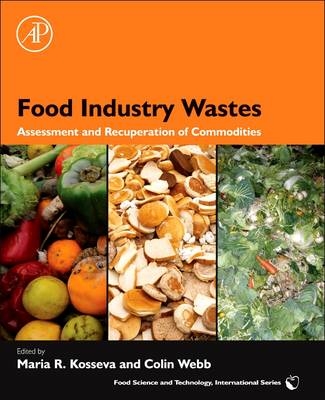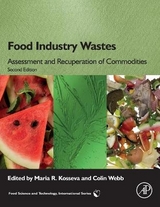
Food Industry Wastes
Academic Press Inc (Verlag)
978-0-12-810254-1 (ISBN)
- Titel erscheint in neuer Auflage
- Artikel merken
More than 34 million tons of food waste was generated in the United States in 2009, at a cost of approximately $43 billion. And while less than three percent of that waste was recovered and recycled, there is growing interest and development in recovering and recycling food waste. These processes have the potential not only to reduce greenhouse gases, but to provide energy and resources for other purposes.
This book examines these topics in detail, starting with sources, characterization and composition of food wastes, and development of green production strategies. The book then turns to treatment techniques such as solid-state fermentation and anaerobic digestion of solid food waste for biogas and fertilizer. A deep section on innovative biocatalysts and bioreactors follows, encompassing hydrogen generation and thermophilic aerobic bioprocessing technologies. Rounding out the volume are extensive sections on water footprints, including electricity generation from microbial fuel cells (MFCs), and life cycle assessments.
Dr. Kosseva's expertise is in the fields of chemical/bioprocess engineering, waste management, and environmental biotechnology. Starting in the Bulgarian Academy of Sciences, her research and teaching skills were further developed at the University of Birmingham, United Kingdom, Catholic University of Louvain-la-Neuve, Belgium, the University of Cape Town, South Africa, and Hiroshima University, Japan. At the University College Dublin, Ireland, she set up and led a new research laboratory. At the University of Nottingham Ningbo China, she established a modern teaching laboratory and taught Biochemical Engineering and Materials Engineering modules. Professor Colin Webb graduated in 1976 as a chemical engineer and earned his PhD in biochemical engineering in 1980. He is a Fellow of the International Academy of Food Science and Technology. His research at the interface between biotechnology and chemical engineering is directed towards the sustainable bioconversion of agricultural raw materials and the development of integrated biorefinery systems.
I. Introduction. Causes and Challenges of Food Wastage
II. Food Industry Wastes: Problems and Opportunities
Chapter 1. Recent European legislation for management of wastes in the food industry
Chapter 2. Sources, characterization and composition of the food wastes
Chapter 3. Development of green production strategies
III. Treatment of Solid Food Wastes
Chapter 4. Use of waste bread to produce fermentation products
Chapter 5. Recovery of commodities from food waste using Solid-State Fermentation
Chapter 6. Functional food and nutraceuticals derived from food industry wastes (FIW)
Chapter 7. Manufacture of biogas and fertiliser from solid food wastes by means of anaerobic digestion
IV. Improved Biocatalysts and Innovative Bioreactors for Enhanced Bioprocessing of Liquid Food Wastes
Chapter 8. Use of immobilized biocatalyst for valorization of whey lactose
Chapter 9. Hydrogen generation from food industry and biodiesel wastes
Chapter 10. Thermophilic aerobic bioprocessing technologies for FIW and wastewater
Chapter 11. Modelling, monitoring and process control for intelligent bioprocessing of FIW and wastewater
V. Impact Assessment of Water Footprint and Rehabilitation of Food Industry Wastewater
Chapter 12. Water Footprint and food processing industry: accounting the impact of food waste from the perspective of use of water resources
Chapter 13. Electrical energy from wineries - A new approach using microbial fuel cells (MFCs)
Chapter 14. Electricity generation from food industry wastewater using the MFC technology
VI. Assessment of Environmental Impact of Food Production and Consumption
Chapter 15. Life Cycle Assessment with the focus on FIW
Chapter 16. Food system sustainability and the consumer
VII. Concluding Remarks and Future Prospects
| Verlagsort | San Diego |
|---|---|
| Sprache | englisch |
| Maße | 216 x 276 mm |
| Themenwelt | Technik ► Elektrotechnik / Energietechnik |
| Technik ► Lebensmitteltechnologie | |
| ISBN-10 | 0-12-810254-3 / 0128102543 |
| ISBN-13 | 978-0-12-810254-1 / 9780128102541 |
| Zustand | Neuware |
| Haben Sie eine Frage zum Produkt? |
aus dem Bereich



